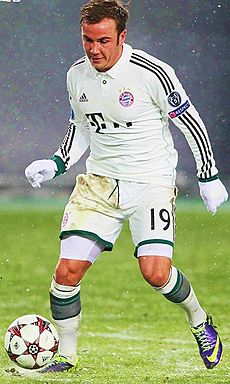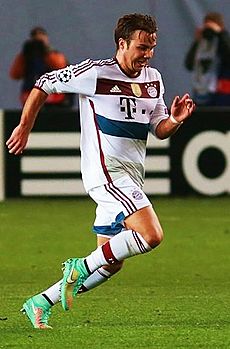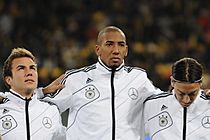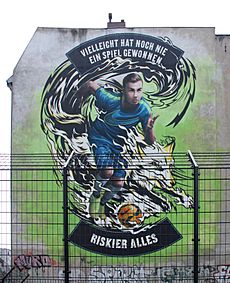Mario Götze facts for kids
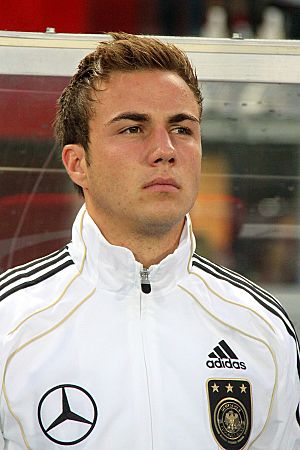
Götze with Germany in 2011
|
||||||||||||||||||||||||||||
| Personal information | ||||||||||||||||||||||||||||
|---|---|---|---|---|---|---|---|---|---|---|---|---|---|---|---|---|---|---|---|---|---|---|---|---|---|---|---|---|
| Full name | Mario Götze | |||||||||||||||||||||||||||
| Date of birth | 3 June 1992 | |||||||||||||||||||||||||||
| Place of birth | Memmingen, Germany | |||||||||||||||||||||||||||
| Height | 1.76 m (5 ft 9 in) | |||||||||||||||||||||||||||
| Position(s) | Attacking midfielder, winger, forward | |||||||||||||||||||||||||||
| Team information | ||||||||||||||||||||||||||||
|
Current team
|
Eintracht Frankfurt | |||||||||||||||||||||||||||
| Number | 27 | |||||||||||||||||||||||||||
| Youth career | ||||||||||||||||||||||||||||
| 1995–1998 | SC Ronsberg | |||||||||||||||||||||||||||
| 1998–2001 | FC Eintracht Hombruch | |||||||||||||||||||||||||||
| 2001–2009 | Borussia Dortmund | |||||||||||||||||||||||||||
| Senior career* | ||||||||||||||||||||||||||||
| Years | Team | Apps | (Gls) | |||||||||||||||||||||||||
| 2009–2013 | Borussia Dortmund | 83 | (22) | |||||||||||||||||||||||||
| 2013–2016 | Bayern Munich | 73 | (22) | |||||||||||||||||||||||||
| 2016–2020 | Borussia Dortmund | 75 | (13) | |||||||||||||||||||||||||
| 2020–2022 | PSV Eindhoven | 47 | (9) | |||||||||||||||||||||||||
| 2022– | Eintracht Frankfurt | 86 | (9) | |||||||||||||||||||||||||
| International career‡ | ||||||||||||||||||||||||||||
| 2007 | Germany U15 | 2 | (0) | |||||||||||||||||||||||||
| 2007–2008 | Germany U16 | 8 | (3) | |||||||||||||||||||||||||
| 2008–2009 | Germany U17 | 13 | (5) | |||||||||||||||||||||||||
| 2009 | Germany U21 | 2 | (0) | |||||||||||||||||||||||||
| 2010–2023 | Germany | 66 | (17) | |||||||||||||||||||||||||
|
Medal record
|
||||||||||||||||||||||||||||
| *Club domestic league appearances and goals, correct as of 19:28, 13 April 2025 (UTC) ‡ National team caps and goals, correct as of 21:36, 25 March 2023 (UTC) |
||||||||||||||||||||||||||||
Mario Götze (born on June 3, 1992) is a German professional footballer. He currently plays for the German club Eintracht Frankfurt. Mario is known for playing as an attacking midfielder, which is a player who helps both defend and attack. He can also play as a winger (a player who plays on the sides of the field) or a forward (a player who scores goals).
Mario Götze played for Borussia Dortmund from 2009 to 2013. During this time, he helped them win the Bundesliga (Germany's top football league) in 2011 and both the Bundesliga and the DFB-Pokal (German Cup) in 2012. He was also part of the team that reached the 2013 UEFA Champions League final. In 2013, he moved to Bayern Munich for a large transfer fee, making him one of the most expensive German players at the time.
At Bayern Munich, he won three more league titles and two DFB-Pokal trophies. He also won the FIFA Club World Cup and the UEFA Super Cup. In 2016, he returned to Borussia Dortmund, where he won another DFB-Pokal title and a DFL-Supercup.
Götze first joined the German national team in 2010 when he was just 18. He was part of the squad for UEFA Euro 2012. Two years later, he scored the winning goal in the 2014 FIFA World Cup final, helping Germany win the World Cup!
Contents
Club Career Highlights
Starting with Borussia Dortmund
Early Days and First Wins
Mario Götze grew up playing football in Dortmund's youth academy. He joined the club when he was only eight years old. He made his first professional appearance in the Bundesliga on November 21, 2009. He came into the game as a substitute for his teammate.
During the winter break of the 2009–10 season, Dortmund's coach, Jürgen Klopp, moved Götze to the main team. Mario quickly became an important player. He helped Dortmund win the Bundesliga title in the 2010–11 season. In 2010, a top German football official, Matthias Sammer, called Götze "one of the best talents Germany has ever had."
In January 2012, Götze had a hip injury. This meant he couldn't play for a while. On March 27, 2012, he signed a new contract with Borussia Dortmund. This contract included a special rule that allowed him to leave if another club offered a certain amount of money. Götze said he felt very comfortable in Dortmund and wanted to be part of the team's growth.
He returned to play in April 2012. Götze helped Borussia Dortmund win the Bundesliga again in 2012. They also won the DFB-Pokal by beating their rivals, Bayern Munich, 5–2 in the final.
Big Games and a Final Season
Götze started the 2012–13 season by scoring the winning goal against Werder Bremen. In December, he scored three goals in one game against Hannover 96 in the DFB-Pokal.
In March 2013, Götze scored and assisted a goal to help Dortmund beat Shakhtar Donetsk in the Champions League. This win sent Dortmund to the quarter-finals for the first time in 15 years. Sadly, Götze got a thigh injury in the semi-final against Real Madrid. This meant he could not play in the Champions League final against Bayern Munich. Dortmund lost that final 2–1.
In his last season with Dortmund, Götze played very well alongside his German teammate Marco Reus. He scored 16 goals in all competitions that season.
Time at Bayern Munich
Moving to a Rival Club
On April 23, 2013, it was announced that Götze would move to Bayern Munich on July 1, 2013. Bayern paid €37 million to sign him, which was a record for a German player at the time. Dortmund's coach, Jürgen Klopp, said Götze wanted to play for Bayern's manager, Pep Guardiola.
First Season Success
Götze made his first appearance for Bayern Munich on August 11, 2013, in a friendly match. He scored two goals in that game. He played his first league game for Bayern on August 24. On October 23, he scored his first goal for Bayern in a Champions League game against Viktoria Plzeň.
On October 26, 2013, Götze scored his first Bundesliga goal for Bayern. On November 23, he scored against his former club, Borussia Dortmund. He did not celebrate the goal out of respect for his old team. In December, Götze helped Bayern win the 2013 FIFA Club World Cup. He scored a long-range goal in the semi-final and helped Bayern win the final.
On March 25, 2014, Götze scored in a game that confirmed Bayern as Bundesliga champions. On May 17, he played the full game against Borussia Dortmund in the 2014 DFB-Pokal Final. Bayern won 2–0 in extra time. Götze scored 15 goals in his first season with Bayern.
More Trophies and Challenges
After helping Germany win the 2014 FIFA World Cup, Götze started the 2014–15 season. He scored twice against SC Paderborn in September. In October, he scored two more goals against Werder Bremen.
In May 2015, some people, like football legend Franz Beckenbauer, criticized Götze for his performances. However, his teammate Arjen Robben supported him, saying that criticism can help a player grow stronger. Götze finished the season with 15 goals.
In the 2015–16 season, Götze continued to play for Bayern. He scored a goal in the DFB-Pokal in August 2015. In September, he scored in a Champions League game against Olympiacos. Bayern's coach, Pep Guardiola, praised Götze for his performance in that game. He scored six goals in 21 games during this season.
Coming Back to Borussia Dortmund
A Fresh Start and a Health Challenge
On July 21, 2016, Götze returned to Borussia Dortmund, signing a four-year contract. He said he regretted his decision to leave for Bayern Munich three years earlier. He played his first official game back for Dortmund on September 11, 2016. Three days later, he scored his first goal for Dortmund since his return in a Champions League game against Legia Warszawa.
In November 2016, Götze helped Dortmund beat Bayern Munich 1–0 by assisting the only goal. In February 2017, Götze had to stop playing because of a "mystery illness." It was later found to be myopathy, a muscle disorder that can cause tiredness and weight gain. This illness helped explain some of his fitness problems over the past few seasons. He scored two goals in 16 games that season.
Recovery and Final Seasons
After his break due to the metabolic illness, Götze returned to play in July 2017. He made his first start in seven months in August 2017, assisting a goal and playing very hard. His coach, Peter Bosz, praised his performance but said they needed to be careful with his recovery. He scored two goals in 32 games that season.
On February 9, 2019, Götze scored his 50th Bundesliga goal. On the first day of the 2019–20 season, he made his 200th appearance for Dortmund.
On May 23, 2020, Borussia Dortmund announced that Götze would leave the club at the end of the season. He played his last game for the team in a 1–0 loss against Bayern Munich. He said goodbye to the club at their stadium before their final match.
Playing for PSV Eindhoven
On October 6, 2020, Götze joined PSV in the Netherlands on a free transfer. He signed a two-year deal. Götze scored in his very first game for PSV on October 18. He was seen as one of the best players in the Dutch league after his first few months, but he also had some injuries.
In July 2021, Götze scored two goals against Galatasaray in a Champions League qualifying game. In August, he scored in a 4–0 win against Ajax in the Johan Cruyff Shield, helping PSV end Ajax's long unbeaten run. On September 6, 2021, Götze signed a new contract with PSV, keeping him there until 2024.
Joining Eintracht Frankfurt
On June 21, 2022, Götze signed a three-year contract with Eintracht Frankfurt in Germany. He has been playing for them since then.
International Career for Germany
Early Appearances and First Goals
After playing for several youth teams, Mario Götze was called up to the senior German national team on November 17, 2010. He made his debut that day, coming on as a substitute. He became the youngest German international player since Uwe Seeler.
Götze scored his first goal for Germany on August 10, 2011, against Brazil. He was 19 years old, making him one of the youngest goalscorers for Germany in a long time. He was included in the squad for UEFA Euro 2012 and made his tournament debut in a 4–2 win against Greece.
The 2014 FIFA World Cup Victory
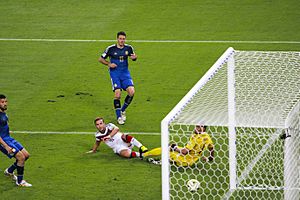
Götze scored four goals during the qualifying games for the 2014 FIFA World Cup. He was then chosen for Germany's team for the main tournament. In Germany's second match, he scored the first goal and was named the best player of the game in a 2–2 draw with Ghana.
In the World Cup final against Argentina, the German coach, Joachim Löw, brought Götze into the game late in the match. Löw told him, "Show the world you are better than Messi and can decide the World Cup." Götze did just that! He scored the only goal of the match in the 113th minute, controlling a pass with his chest and then kicking the ball into the net. This gave Germany their fourth World Cup title.
He became the first substitute player to score a World Cup-winning goal. He was also the youngest player to score in a World Cup Final since 1966. Götze was named the best player of the final match.
Euro 2016 and Recent Appearances
Götze played in UEFA Euro 2016, where Germany reached the semi-finals. He played in four matches during the tournament.
After a break from the national team, Götze played in a friendly game against France in November 2017. On November 10, 2022, Götze was chosen for Germany's squad for the 2022 FIFA World Cup. This was a surprise for many, as it marked his return to the national team after five years.
How Mario Götze Plays
Mario Götze can play in several different positions on the field. He can play as a winger on either the left or right side, as an attacking midfielder (who helps create goals), or even as a "false 9" (a forward who drops back to help in midfield).
Götze was once considered one of the best young players in the world. He was known for his speed, great technique, dribbling skills, and ability to create chances for his teammates. In 2010, Matthias Sammer, a German football official, said Götze was "one of the best talents Germany has ever had." A year later, German football legend Franz Beckenbauer called Götze "German Messi" because of his speed and playing style.
However, Götze's speed changed as he got older. This was seen as one reason for his second departure from Borussia Dortmund.
Life Outside Football
Family and Personal Life
Mario Götze was born in Memmingen, Germany. His father is a professor at the Dortmund University of Technology. Because of his father's work, Mario lived in the United States for 18 months when he was younger. His older brother, Fabian, also played football. His younger brother, Felix, currently plays for Rot-Weiss Essen.
Mario Götze has been with German model Ann-Kathrin Brömmel since July 2012. They got engaged in 2017 and married in May 2018. They welcomed a son in 2020 and a daughter in 2023. Mario Götze is Christian.
Health Challenges
In early March 2017, it was reported that Götze was dealing with a metabolic disorder. This health condition was later identified as myopathy, which is a muscle disorder. It affects how muscle fibers work and can cause tiredness and weight gain.
Götze released a statement saying, "I'm currently undergoing treatment and will do everything in my power to be back in training and helping my team to achieve our common goals as soon as possible."
Sponsorships and Media
In 2011, Götze signed a sponsorship deal with the sports company Nike. He appeared in a Nike advertisement in 2012. In March 2014, he was one of the first players to wear Nike's new Magista boots.
Götze also appeared in an advertisement for the South Korean company Samsung alongside other famous footballers like Cristiano Ronaldo and Lionel Messi. In August 2014, the video game company Konami announced that Götze would be on the front cover of their game Pro Evolution Soccer 2015.
Career Statistics
Club Appearances and Goals
| Club | Season | League | National cup | Europe | Other | Total | ||||||
|---|---|---|---|---|---|---|---|---|---|---|---|---|
| Division | Apps | Goals | Apps | Goals | Apps | Goals | Apps | Goals | Apps | Goals | ||
| Borussia Dortmund | 2009–10 | Bundesliga | 5 | 0 | 0 | 0 | — | — | 5 | 0 | ||
| 2010–11 | Bundesliga | 33 | 6 | 2 | 0 | 6 | 2 | — | 41 | 8 | ||
| 2011–12 | Bundesliga | 17 | 6 | 2 | 1 | 6 | 0 | 1 | 0 | 26 | 7 | |
| 2012–13 | Bundesliga | 28 | 10 | 4 | 4 | 11 | 2 | 1 | 0 | 44 | 16 | |
| Total | 83 | 22 | 8 | 5 | 23 | 4 | 2 | 0 | 116 | 31 | ||
| Bayern Munich | 2013–14 | Bundesliga | 27 | 10 | 4 | 1 | 11 | 3 | 3 | 1 | 45 | 15 |
| 2014–15 | Bundesliga | 32 | 9 | 4 | 2 | 11 | 4 | 1 | 0 | 48 | 15 | |
| 2015–16 | Bundesliga | 14 | 3 | 2 | 1 | 4 | 2 | 1 | 0 | 21 | 6 | |
| Total | 73 | 22 | 10 | 4 | 26 | 9 | 5 | 1 | 114 | 36 | ||
| Borussia Dortmund | 2016–17 | Bundesliga | 11 | 1 | 1 | 0 | 4 | 1 | 0 | 0 | 16 | 2 |
| 2017–18 | Bundesliga | 23 | 2 | 0 | 0 | 9 | 0 | 0 | 0 | 32 | 2 | |
| 2018–19 | Bundesliga | 26 | 7 | 2 | 0 | 6 | 0 | — | 34 | 7 | ||
| 2019–20 | Bundesliga | 15 | 3 | 2 | 0 | 4 | 0 | 0 | 0 | 21 | 3 | |
| Total | 75 | 13 | 5 | 0 | 23 | 1 | 0 | 0 | 103 | 14 | ||
| PSV Eindhoven | 2020–21 | Eredivisie | 18 | 5 | 1 | 0 | 6 | 1 | — | 25 | 6 | |
| 2021–22 | Eredivisie | 29 | 4 | 5 | 2 | 17 | 5 | 1 | 1 | 52 | 12 | |
| Total | 47 | 9 | 6 | 2 | 23 | 6 | 1 | 1 | 77 | 18 | ||
| Eintracht Frankfurt | 2022–23 | Bundesliga | 32 | 3 | 6 | 0 | 7 | 0 | 1 | 0 | 46 | 3 |
| 2023–24 | Bundesliga | 30 | 3 | 2 | 1 | 9 | 0 | — | 41 | 4 | ||
| 2024–25 | Bundesliga | 24 | 3 | 3 | 0 | 8 | 2 | — | 35 | 5 | ||
| Total | 86 | 9 | 11 | 1 | 24 | 2 | 1 | 0 | 122 | 12 | ||
| Career total | 364 | 75 | 40 | 12 | 118 | 21 | 11 | 2 | 532 | 111 | ||
International Appearances and Goals
| National team | Year | Apps | Goals |
|---|---|---|---|
| Germany | 2010 | 1 | 0 |
| 2011 | 11 | 2 | |
| 2012 | 8 | 1 | |
| 2013 | 6 | 3 | |
| 2014 | 15 | 7 | |
| 2015 | 7 | 3 | |
| 2016 | 14 | 1 | |
| 2017 | 1 | 0 | |
| 2018 | 0 | 0 | |
| 2019 | 0 | 0 | |
| 2020 | 0 | 0 | |
| 2021 | 0 | 0 | |
| 2022 | 2 | 0 | |
| 2023 | 1 | 0 | |
| Total | 66 | 17 | |
- Scores and results list Germany's goal tally first, score column indicates score after each Götze goal.
| No. | Date | Venue | Opponent | Score | Result | Competition |
|---|---|---|---|---|---|---|
| 1 | 10 August 2011 | Mercedes-Benz Arena, Stuttgart, Germany | 2–0 | 3–2 | Friendly | |
| 2 | 2 September 2011 | Veltins-Arena, Gelsenkirchen, Germany | 6–2 | 6–2 | UEFA Euro 2012 qualifying | |
| 3 | 7 September 2012 | AWD-Arena, Hanover, Germany | 1–0 | 3–0 | 2014 FIFA World Cup qualification | |
| 4 | 22 March 2013 | Astana Arena, Astana, Kazakhstan | 2–0 | 3–0 | 2014 FIFA World Cup qualification | |
| 5 | 26 March 2013 | Frankenstadion, Nuremberg, Germany | 2–0 | 4–1 | 2014 FIFA World Cup qualification | |
| 6 | 15 October 2013 | Friends Arena, Solna, Sweden | 2–2 | 5–3 | 2014 FIFA World Cup qualification | |
| 7 | 5 March 2014 | Mercedes-Benz Arena, Stuttgart, Germany | 1–0 | 1–0 | Friendly | |
| 8 | 6 June 2014 | Coface Arena, Mainz, Germany | 5–1 | 6–1 | Friendly | |
| 9 | 6–1 | |||||
| 10 | 21 June 2014 | Castelão, Fortaleza, Brazil | 1–0 | 2–2 | 2014 FIFA World Cup | |
| 11 | 13 July 2014 | Estádio do Maracanã, Rio de Janeiro, Brazil | 1–0 | 1–0 (aet) | 2014 FIFA World Cup | |
| 12 | 3 September 2014 | Esprit Arena, Düsseldorf, Germany | 2–4 | 2–4 | Friendly | |
| 13 | 14 November 2014 | Frankenstadion, Nuremberg, Germany | 3–0 | 4–0 | UEFA Euro 2016 qualifying | |
| 14 | 10 June 2015 | RheinEnergieStadion, Cologne, Germany | 1–0 | 1–2 | Friendly | |
| 15 | 4 September 2015 | Commerzbank-Arena, Frankfurt, Germany | 2–0 | 3–1 | UEFA Euro 2016 qualifying | |
| 16 | 3–1 | |||||
| 17 | 29 March 2016 | Allianz Arena, Munich, Germany | 2–0 | 4–1 | Friendly |
Football Achievements
Borussia Dortmund
- Bundesliga: 2010–11, 2011–12
- DFB-Pokal: 2011–12, 2016–17
- DFL-Supercup: 2019
- UEFA Champions League runner-up: 2012–13
Bayern Munich
- Bundesliga: 2013–14, 2014–15, 2015–16
- DFB-Pokal: 2013–14, 2015–16
- UEFA Super Cup: 2013
- FIFA Club World Cup: 2013
PSV Eindhoven
- KNVB Cup: 2021–22
- Johan Cruyff Shield: 2021
Eintracht Frankfurt
- DFB-Pokal runner-up: 2022–23
- UEFA Super Cup runner-up: 2022
Germany U17
- UEFA European Under-17 Championship: 2009
Germany National Team
- FIFA World Cup: 2014
- UEFA European Championship bronze: 2012
Individual Awards
- Ballon d'Or: 2014 (15th place)
- UEFA European Under-17 Football Championship Golden Player: 2009
- UEFA European Under-17 Football Championship Team of the tournament: 2009
- Fritz Walter Medal: U17 Gold Medal 2009
- Fritz Walter Medal: U18 Gold Medal 2010
- Bundesliga Young Player of the Year: 2010–11
- kicker Bundesliga Team of the Season: 2010–11, 2012–13
- VDV Newcomer of the Season: 2010–11
- Golden Boy: 2011
- Goal of the Month (Germany): July 2014
- Goal of the Year (Germany): 2014
- Silbernes Lorbeerblatt: 2014
See also
 In Spanish: Mario Götze para niños
In Spanish: Mario Götze para niños
 | Audre Lorde |
 | John Berry Meachum |
 | Ferdinand Lee Barnett |


